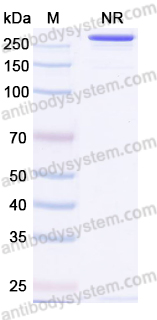Catalog No.
RHJ04102
Species reactivity
Human
Host species
Mouse
Isotype
IgG1
Clonality
Monoclonal
Tested applications
ELISA: 1:10000, WB: 1:500-1:2000
Target
ATG16L1, Autophagy-related protein 16-1, APG16L, APG16-like 1
Concentration
1 mg/ml
Endotoxin level
Please contact with the lab for this information.
Purity
>95% as determined by SDS-PAGE.
Purification
Protein A/G purified from cell culture supernatant.
Accession
Q676U5
Applications
ELISA, WB
Form
Liquid
Storage buffer
0.01M PBS, pH 7.4, 0.05% Sodium Azide.
Stability and Storage
Use a manual defrost freezer and avoid repeated freeze-thaw cycles. Store at 4°C short term (1-2 weeks). Store at -20°C 12 months. Store at -80°C long term.
Clone ID
R3U96
Therapeutic drug monitoring and immunogenetic factors associated with the use of adalimumab in Crohn's disease patients., PMID:39959979
Association between ATG16L1 rs2241880(T300A) and rs4663421 and ANCA‑associated vasculitis in the Guangxi population of China: Propensity score matching analysis., PMID:39483332
Tocilizumab unfolds colo-protective and immunomodulatory effect in experimentally induced ulcerative colitis via mitigating autophagy and ER stress signaling., PMID:39134818
The expression of autophagy markers in IVIG-resistant Kawasaki disease and the establishment of prediction model., PMID:38114939
Associations between ATG16L1 gene polymorphism and antineutrophil cytoplasmic antibody-associated vasculitis in the Chinese Guangxi population: A case-control study., PMID:36082465
Autophagy and intracellular product degradation genes identified by systems biology analysis reduce aggregation of bispecific antibody in CHO cells., PMID:35123066
The BAX-binding protein MOAP1 associates with LC3 and promotes closure of the phagophore., PMID:33783314
Emerging roles of let‑7d in attenuating pulmonary arterial hypertension via suppression of pulmonary artery endothelial cell autophagy and endothelin synthesis through ATG16L1 downregulation., PMID:32319531
Autophagy Protects Against Developing Increased Lung Permeability and Hypoxemia by Down Regulating Inflammasome Activity and IL-1β in LPS Plus Mechanical Ventilation-Induced Acute Lung Injury., PMID:32117318
Streptococcus pneumoniae triggers hierarchical autophagy through reprogramming of LAPosome-like vesicles via NDP52-delocalization., PMID:31932716
An antibody for analysis of autophagy induction., PMID:31768061
Morphological spectrum of immune check-point inhibitor therapy-associated gastritis., PMID:31692018
Atg14 protects the intestinal epithelium from TNF-triggered villus atrophy., PMID:30894050
Epithelial endoplasmic reticulum stress orchestrates a protective IgA response., PMID:30819965
Genotype-Serotype Interactions Shed Light on Genetic Components of Inflammatory Bowel Diseases., PMID:30265311
ATG5 is required for B cell polarization and presentation of particulate antigens., PMID:30196744
Attenuation of autophagy impacts on muscle fibre development, starvation induced stress and fibre regeneration following acute injury., PMID:29899362
T300A variant of AT16L1 gene in a cohort of Algerian Crohn disease patients., PMID:29519712
Impaired granulocyte-macrophage colony-stimulating factor bioactivity accelerates surgical recurrence in ileal Crohn's disease., PMID:29434451
Selective autophagy of the adaptor TRIF regulates innate inflammatory signaling., PMID:29358708
Genetic polymorphism in ATG16L1 gene is associated with adalimumab use in inflammatory bowel disease., PMID:29228965
[Susceptibility genes and serum markers of intestinal fibrosis in Crohn disease]., PMID:29178104
The protection role of Atg16l1 in CD11c+dendritic cells in murine colitis., PMID:28390705
Exocytosis of Varicella-Zoster Virus Virions Involves a Convergence of Endosomal and Autophagy Pathways., PMID:27440906
Expression of aryl hydrocarbon receptor and ATG16L1 protein in experimental oxazolone-induced colitis in rats., PMID:26845845
Autophagy Contributes to the Induction of Anti-TNF Induced Macrophages., PMID:26417049
TRAF3IP3, a novel autophagy up-regulated gene, is involved in marginal zone B lymphocyte development and survival., PMID:26011558
A SPECIAL MEETING REVIEW EDITION: Highlights in Anti-Tumor Necrosis Factor Monitoring and Antibody Monitoring From the 2014 DDW Meeting: Digestive Disease Week 2014 May 3-6, 2014 • Chicago, Illinois: Special Reporting on:• Therapeutic Monitoring of Anti-TNF Levels and Antibodies to Predict Response and Achieve Mucosal Healing• Prospective Therapeutic Drug Monitoring and Optimization of Infliximab Maintenance Therapy in IBD• Classification of Non-IBD, Crohn's Disease and Ulcerative Colitis in a Young Patient Population Using a Multi-Marker Diagnostic Panel• Persistence of Antibodies to Infliximab for More Than Two Months Predicts Loss of Response to Infliximab in Inflammatory Bowel Diseases• Pre-Operative Serological Markers May Predict Postoperative Crohn's Disease Recurrence: Results From a Prospective Mono-Centric Trial• Antibodies and Levels of Biologies-Reactive vs Proactive Measurements• Higher 6-Thioguanine Nucleotide Concentrations Are Associated With Higher Trough Levels of Infliximab in Patients on Combination Therapy• The Clinical and Immunological Significance of Low Levels of Infliximab in the Absence of Anti-lnfliximab Antibodies in Patients With IBD• Antibodies to Adalimumab Predict Inflammation in Crohn's Patients on Maintenance Adalimumab Therapy• ATG16L1 Genotype Is Associated With Response to Anti-TNFWith Expert Commentary by:William J. Sandborn, MDProfessor and Chief, Division of Gastroenterology Director, UCSD IBD CenterUC San Diego Health SystemLa Jolla, California., PMID:25892982
Monocyte-derived macrophages from Crohn's disease patients are impaired in the ability to control intracellular adherent-invasive Escherichia coli and exhibit disordered cytokine secretion profile., PMID:25805890
Genetic polymorphism in ATG16L1 gene influences the response to adalimumab in Crohn's disease patients., PMID:25712183
HIF1A regulates xenophagic degradation of adherent and invasive Escherichia coli (AIEC)., PMID:25484075
A multilocus genetic study in a cohort of Italian SLE patients confirms the association with STAT4 gene and describes a new association with HCP5 gene., PMID:25369137
Aliskiren-attenuated myocardium apoptosis via regulation of autophagy and connexin-43 in aged spontaneously hypertensive rats., PMID:24702827
Predicting complicated Crohn's disease and surgery: phenotypes, genetics, serology and psychological characteristics of a population-based cohort., PMID:23725363
Genetic susceptibility to increased bacterial translocation influences the response to biological therapy in patients with Crohn's disease., PMID:23376290
Chikungunya virus-induced autophagy delays caspase-dependent cell death., PMID:22508836
Arf6 promotes autophagosome formation via effects on phosphatidylinositol 4,5-bisphosphate and phospholipase D., PMID:22351926
Pattern recognition receptor and autophagy gene variants are associated with development of antimicrobial antibodies in Crohn's disease., PMID:22275320
Innate immunity in the small intestine., PMID:22241076
Interactions between the host innate immune system and microbes in inflammatory bowel disease., PMID:21530739
Loss of the autophagy protein Atg16L1 enhances endotoxin-induced IL-1beta production., PMID:18849965
Abnormal mucosal immune response to altered bacterial flora following restorative proctocolectomy in patients with ulcerative colitis: serologic measures, immunogenetics, and clinical correlations., PMID:18499066



